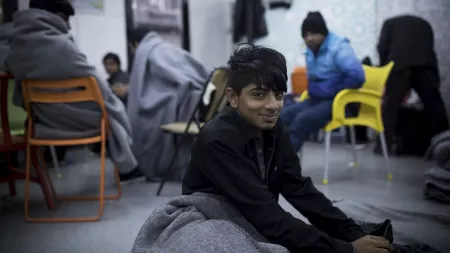Balkans and Greece: Stranded refugees face freezing temperatures
Stranded refugees in the Balkans and Greece face freezing temperatures and are in urgent need of assistance, warns the international aid organization CARE

 Middle East, North Africa and Europe
Middle East, North Africa and Europe
Serbia ranks 64 out of 189 on the Human Development Index (HDI). CARE International’s work in Serbia is focused on supporting peace and reconciliation efforts, with emphasis on supporting marginalized groups.
CARE International has been working in the Balkans since 1993, initially providing humanitarian aid for refugees and victims of war.
Today, CARE International works in Bosnia and Herzegovina, Croatia, Serbia, Kosovo, Montenegro, North Macedonia, and Albania and seeks to help build sustainable peace and development in the region.
Our programs support economic activities on regional levels, peace and reconciliation efforts, integration of minorities, and the creation of opportunities for young people.
We place special focus on working with vulnerable groups, including women and girls, Roma communities, and poor farmers to promote social and economic rights for all.
Since 2020, CARE International has been responding to COVID-19 in the Balkans. Response efforts have included mobilizing national civil society organizations to inform communities in methods to prevent the spread of COVID-19, as well as providing equipment and support to healthcare institutions serving marginalized populations.
Stranded refugees in the Balkans and Greece face freezing temperatures and are in urgent need of assistance, warns the international aid organization CARE
Biting winds and freezing temperatures of up to minus 10 degrees Celsius pose severe health risks for refugees in the Western Balkans. At the same time, increased activities by smugglers put those already exhausted from their journey at risk of being abused and injured.
CARE welcomes new EU commitment to provide shelter to an additional 100,000 migrants and asylum-seekers arriving in the Balkans.

As the US is bracing for Inauguration day in the wake of shocking violence on January 6, the partners CARE works with in Albania, Bosnia and Herzegovina, Croatia, Kosovo, and Serbia are celebrating some of the successes they have had running programs to counter violent extremism, especially with young men.

When young people are granted the opportunity to lead, they find ways to connect, to support, and to make changes—not just now, but for the future.
We meet Djordjie first thing in on a typically busy morning at the centre. He’s overseeing the arrivals of new refugees while dozens of men and boys who have spent the night in the centre, sheltering from the cold Belgrade winter, are starting to wake. The centre is warm, but the smell of dozens of unclean bodies is inescapable as many of the arrivals haven’t slept indoors, or had access to washing facilities, for many weeks or months.
In FY2023, CARE worked around the world, contributing to saving lives, fighting poverty, and increasing social justice.